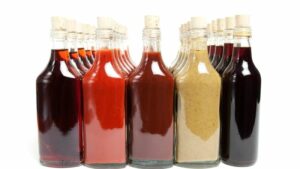That forgotten bottle of hot sauce in the back of your pantry – is it still safe to use? Hot sauce is beloved for bringing flavorful heat to dishes. But without refrigeration, you may wonder if it goes bad. Good news – unopened hot sauce lasts a surprisingly long time. And even open bottles keep longer than you might think. Still, stale or spoiled hot sauce can ruin your next meal.
Before dousing your food in fiery flavor, it’s helpful to understand exactly how long that hot sauce lasts once open or unopened. Shelf life varies based on preparation methods, ingredients, and storage conditions. Following some simple guidelines ensures your hot sauce stays fresh and delicious. The right knowledge helps you keep enjoying that signature
The shelf life of hot sauce depends on factors like pasteurization and acidity levels. Properly stored under the right conditions, an unopened bottle can stay potent for up to 3 years in the pantry. Once opened, that timeframe shrinks – but refrigeration extends it. Learn what to look for and how to tell when hot sauce has passed its prime. With a few tips, you can stop wondering “Is this still good?” and keep the party going with your favorite spicy condiment.
Unopened Hot Sauce Has a Long Shelf Life
Let’s start with hot sauce still sealed in its original bottle before opening. Known as “factory sealed,” these unopened containers provide the longest shelf life. Here’s how long hot sauce lasts in its sealed state:
- 1-2 years unrefrigerated – Most standard commercial hot sauces stay fresh for 12-24 months stored in the pantry, according to USDA recommendations.
- Up to 5 years unrefrigerated – Some hot sauce brands advertise potential shelf life up to 5 years or more for unopened bottles stored properly.
- Indefinite refrigerated – Unopened hot sauce lasts indefinitely in the fridge with quality slowly degrading over time. Refrigeration further extends shelf life.
These long shelf lives result from:
- Pasteurization – Commercial hot sauces are heat treated to eliminate bacteria. This prevents foodborne illnesses.
- Preservatives – Ingredients like vinegar and sodium benzoate inhibit microbial growth.
- Airtight seal – The unbroken factory seal prevents oxygen exposure allowing longer freshness.
- Acidity – Most hot sauces have a very low pH which makes them inhospitable to microbes.
So as long as the bottle remains properly sealed, an unopened hot sauce stays safe and usable for years in the pantry, even more in the fridge.
Opened Hot Sauce Shelf Life Gets Shorter
Once you crack the seal and open that bottle, exposure to air and microbes cuts down the stable shelf life. Here’s how long opened hot sauce generally lasts:
- 3-6 months in pantry – Opened hot sauce stored unrefrigerated will stay freshest for about 6 months, though it may last longer safely depending on type.
- 1-2 years refrigerated – Storing opened hot sauce in the fridge can extend its shelf life to 1-2 years due to colder temperatures.
With no airtight seal preventing oxygen and bacteria getting in, opened hot sauce degrades more quickly. But the other protective factors – pasteurization, preservatives, and acidity – continue inhibiting rapid spoilage. Refrigerating opened bottles is ideal for maximizing freshness.
How Ingredients Impact Hot Sauce Longevity
Not all hot sauces are created equal when it comes to how long they last. Ingredients and preparation methods also affect shelf life.
Fresh peppers
- Sauces with fresh pepper purees tend to have shorter life unrefrigerated – 2-3 months once opened.
Cooked hot sauce
- Past work suggests that hot sauces made via cook methods like fermentation or pickling last 6+ months after opening.
Preservatives
- Vinegar, garlic, and sodium benzoate all help limit microbial growth for longer shelf life.
Extracts
- Sauces using capsaicin extract for heat can degrade faster than ones with whole peppers.
pH levels
- More acidic hot sauces (pH below 4.2) resist bacteria better for longer life.
Oil separation
- Oil separating from other ingredients can indicate hot sauce is near end of shelf life.
So while specific times vary, more “natural” sauces with fresh ingredients may have shorter life than traditionally made types when open.
How to Tell If Hot Sauce Has Gone Bad
Because hot sauce can last so long unrefrigerated, it’s important to monitor its freshness once opened. Here are signs that hot sauce has spoiled and should be discarded:
- Unnatural changes in appearance – abnormal textures, shades, fuzziness, etc.
- Strong medicinal, rotten, or unpleasant aromas
- Funky sour, bitter, or sharp taste that is significantly “off”
- Extreme separation of oil or watery liquids – emulsions breaking down
- Any mold growing in or on the hot sauce itself
- Rusted, popped, or leaking lid indicating metal corrosion
Trust your eyes, nose, and taste over dates – they detect degradation. If anything seems far off from when freshly opened, it’s best to err on the side of caution and throw it away.
Storing Hot Sauce for Maximum Freshness
To get the most life out of that hot sauce – follow these storage tips:
- Store unopened bottles in a cool, dry pantry away from direct light
- Refrigerate after opening to significantly extend shelf life
- Check seals for tightness and leaks – especially if storing for long periods
- Keep lids clean to avoid contamination from dirt or food residue
- Wipe bottle rims to prevent buildup of dripped sauce which can harbor microbes
- Keep bottles away from heat or moisture which speed up spoilage
With the right storage methods, you can keep hot sauce fiery and flavorful for months or years, sealed or open. Trust your senses, watch for signs of spoilage, and enjoy the heat!
FAQ: How Long Does Hot Sauce Last Unrefrigerated?
Does hot sauce need to be refrigerated at all?
Refrigeration will extend the shelf life of hot sauce significantly. But thanks to preservatives and acidity, it can safely be kept unrefrigerated for months when properly stored.
Do different types of hot sauce last longer than others?
Yes, sauces made with cooked pepper purees, vinegar, and preservatives tend to have longer shelf lives than “fresh” styles with raw ingredients.
Can I eat hot sauce past the expiration or best-by date?
You can safely eat it past the printed date as long as there are no signs of spoilage. The date indicates peak quality rather than safety.
How can I tell if hot sauce has expired?
Check for changes in texture, appearance, aroma or taste. Signs like mold, separation, rancid smells or bitterness indicate it has spoiled.
Is it safe to add old hot sauce to food I’m cooking?
No, do not use spoiled hot sauce in cooked foods, even if you plan to reheat them. Only use hot sauce that has been properly stored and shows no signs of degradation.





